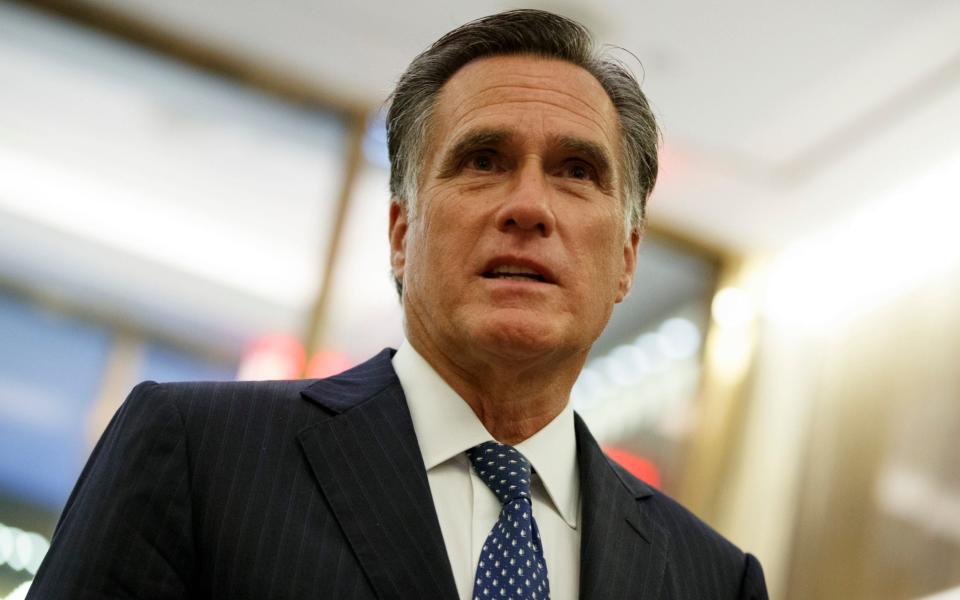Mitt Romney clears way for Trump to push through speedy Supreme Court nomination

Donald Trump is likely to have the votes in the US Senate to confirm a Supreme Court nominee before the election after Mitt Romney became the latest Republican moderate to back a speedy process.
Mr Romney, the Utah senator who was the Republican presidential nominee for the 2012 election, had been seen as a possible rebel given he is one of the few senators willing to publicly speak out against the US president.
However on Tuesday Mr Romney disappointed liberals by making explicit his willingness to vote on the person Mr Trump picks to fill the Supreme Court seat open after the death of Ruth Bader Ginsburg last week.
“The Constitution gives the president the power to nominate and the Senate the authority to provide advice and consent on Supreme Court nominees,” Mr Romney said in a statement announcing his position.
“Accordingly, I intend to follow the Constitution and precedent in considering the president’s nominee. If the nominee reaches the Senate floor, I intend to vote based upon their qualifications.”
Mr Romney’s announcement swiftly followed two other closely watched Republican senators, Cory Gardner of Colorado and Charles Grassley of Iowa, making similar comments indicating their willingness to vote.
Only two Republican senators have announced their opposition to voting on a nominee before the election, Susan Collins of Maine and Lisa Murkowski of Alaska. At least four Republican rebels would be needed to block the confirmation.
All indications are that the Republicans will now push ahead with an attempt to get whoever Mr Trump nominates both approved by the Senate Judiciary Committee and the full Senate before election day on November 3.
Lindsey Graham, the Republican chairman of that committee, which is in charge of holding confirmation hearings, said on Monday night the party had the votes it needed.
Mr Graham said on Fox News: “We've got the votes to confirm Justice Ginsburg's replacement before the election, we're going to move forward in the committee, we're going to report the nomination out of the committee to the floor of the United States Senate so we can vote before the election.”
Usually the confirmation process for a Supreme Court justice takes two to three months. Under those timings, this nominee would be confirmed in around a month - one of the quickest in modern times.
Mr Trump announced on Tuesday that he will name the person he is nominating to fill the open seat on Saturday, after the funeral services for Ms Ginsburg.
Under Mr Trump’s new timetable his Supreme Court nominee would be confirmed within at most 38 days. The New York Times said the last time a nominee facing “meaningful opposition” was confirmed that quickly was 1949.
Amy Coney Barrett, a circuit judge on the US Court of Appeals for the Seventh Circuit who was nominated by Mr Trump for that role, is the front-runner, according to US media reports.
Mr Trump met with Ms Barrett on Monday. Her conservative instincts and Catholic faith became points of focus during the confirmation process for her current judicial position.
The apparent decision by the Republican leadership to push for a confirmation before the election, when they hold the White House and the Senate, rather than afterwards, when they could lose one or both, will shape how the issue plays with voters.
If the confirmation is successful, there would be no open seat on the Supreme Court to be filled by the next president - meaning Mr Trump loses an incentive he could hold out to potential supporters.
But confirming three Supreme Court justices during his first term would be a reminder to evangelical voters, a core part of his support base, of the importance of his presidency.
Forcing a confirmation through before the vote could also further energise Democrats. A record-breaking $160 million has been given by Democratic contributors online through ActBlue, the leading site for processing digital donations, since Ms Ginsburg's passing.
Republican senators have argued that they are not breaking with the standard they held up in 2016 when blocking then president Barack Obama from filling the open Supreme Court seat.
They are noting that at the time the White House and Senate were held by different parties, whereas now both are held by the same party, the Republicans.

